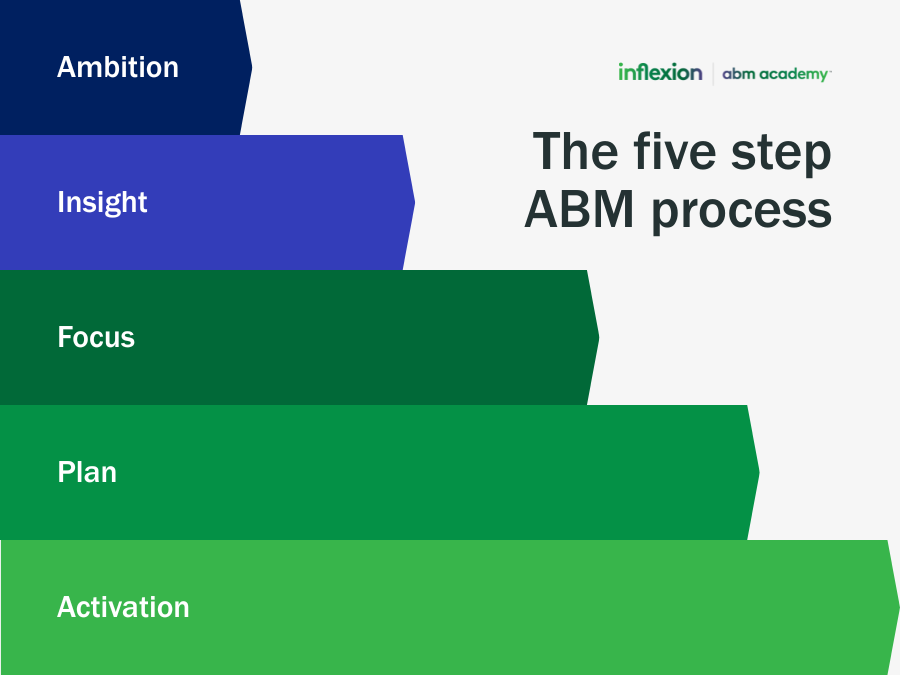Sharing research, insights, trends and advice to help you keep up with the latest in ABM
Hello everyone,
Welcome to the fourth edition of The ABM-er, a newsletter set up to share research, insights, trends, and advice to help you keep up with the evolution of ABM best practices. As a reminder, here’s what you can expect each month:
- Excerpts from my new book Account-Based Marketing: The definitive handbook for B2B marketers, due for publication in March 2025
- Actionable tips: ABM how-to guides, frameworks, and checklists
- Real world examples and perspectives from global companies successfully using ABM
- Industry research, insights and trends and my take on their implications for ABM-ers
In this edition…
This month, I’m looking at the way ABM is reshaping how we do B2B marketing, drawing on the first chapter in my book, Account-Based Marketing: The definitive handbook for B2B marketers, published by Kogan Page in March.
As part of this month’s edition, we’ll look at a real-world example from Pegasystems, exploring the role ABM is playing in the company’s go-to-market approach.
I’ll also share some highlights from the interview Malcolm McDonald gave me for the book. He is Emeritus Professor of Marketing at Cranfield University School of Management, and a recognised authority on marketing planning, key account management and value propositions.
I hope this month’s edition will help you to think about the role ABM plays in your go-to-market approach.
If you enjoy this newsletter, please subscribe to receive future editions: https://bit.ly/43FJ3Cb
Many thanks,
Bev.
How is ABM reshaping B2B marketing?
I believe ABM has developed to the point where it is reshaping B2B marketing. There’s lots of evidence to support my conviction, not least of which is the way that whole marketing teams are shifting marketing resource allocation to ABM, including whole field marketing teams. Inflexion Group’s ABM benchmarking research from 2024 showed that 22% of marketing budgets and 16% of headcount is allocated to ABM on average.
Why has this happened? I think that there are seven key drivers, namely:
- The scale and complexity of some client organisations (81 companies on Fortune’s list have annual revenues in excess of $100bn, while only 69 countries on the World Bank list have a GDP in excess of $100bn).
- The largest enterprise customers have globalised their operations and want to do business across multiple geographies with a few strategic suppliers who understand them and are invested in their success.
- Purchase decisions for high consideration, complex transactions increasingly involve large groups of buyers looking to reach consensus before making a decision, and several analysts suggest their buying journey is over halfway through before they reach out to potential suppliers.
- Companies like Amazon, Netflix and Spotify have trained buyers to expect their suppliers to recognise and know them well enough engage in the way they want and anticipate what they’ll want to do next, making targeted recommendations based on data and predictive modelling.
- Many companies are using the alignment of values, culture and the approach to sustainability in their potential suppliers as key factors in their selection decisions, necessitating a deep understanding of a customer’s attitude to ESG and, beyond that, a willingness to partner for the benefit of wider society over the longer term.
- Many companies have recognised that their existing customers represent their best opportunity for sustainable growth and so have switched the majority of their resources to nurturing and retaining these customers. ABM is a natural marketing strategy to complement this and increasingly business leaders are asking their CMOs to refocus resources onto ABM.
- As marketing budgets stay the same or decrease in today economic environment, so marketing leaders are prioritising initiatives that offer the best return on investment. As ABM has been proven to deliver a higher ROI than any other B2B marketing approach, it is the perfect way to deliver more for less.
These seven drivers are complemented by four enablers for ABM, including the increasing availability of customer data to shape an ABM approach, the evolution of ABM platforms and agencies to support ABM programmes, and the possibilities for increased productivity and creativity that come with generative and agentic AI.
These drivers and enablers for ABM are summarised below. Together, they explain the increasing role ABM plays in go-to-market strategies around the world.

ABM at Pegasystems
When Catherine Dutton arrived at Pegasystems in May 2022, ABM had already been in place for a few years. However, as Dutton, now VP Global Growth Marketing, explains, it was then very much focused on winning new business as a form of deal-based marketing rather than concentrating on a more strategic, one-to-one approach.
The programme has undergone a significant revamp, with the ABM strategy increasingly geared toward creating deeper relationships and expanding business with existing clients. Today, the ABM programme, combines a blended approach that promotes both consistency and flexibility so the ABM team can do more with resources and budgets. Focused on delivering personalised experiences to encourage those client relationships, the ABM programme nevertheless has a focus on providing a repeatable set of capabilities that can easily be customised to offer scale. It consists of three categories:
- Strategic one-to-one ABM.
- Strategic ABM Lite.
- Programmatic ABM.
The Pega Executive Team is fully bought into ABM and the power it has to deepen client engagement. The ABM team have been asked to scale the approach and make ABM as self-service as possible for account teams, so it is highly focused on creating self-service opportunities, giving account teams access to templates, tools, and guides to use with clients directly.
The ABM team also works in alignment with the company’s strong product and corporate marketing teams. “We have marketers that are focused on product marketing, and they report into the product parts of our business. We also have a corporate marketing team dedicated to channels including video, the website, digital media, public relations, social media, events, and brand. What we don’t have any more is separate field marketing. The team I lead has replaced field marketing,” confirms Dutton.
In the spring of 2024, the company established a Marketing Centre of Excellence (CoE) to further coordinate different requirements and requests, figure out how best to prioritise and schedule activities, maximise resource allocation and, ultimately, improve return on investment by using those synergies to strengthen client relationships as efficiently as possible.
Client engagement is the key success metric for the programme. ABM success is also tracked through other measures, including:
- Increasing new contacts created within the customer organisation in line with stakeholder maps.
- Enabling pipeline growth and closed pipeline related to sustained and increased client engagement.
- Delivering costs savings.
- Increasing brand awareness (a measure for marketing as a whole).
What is critical, concludes Dutton, is to make sure that everyone understands what ABM is and what role ABM-ers can play in contributing to company success: “It’s all about people working together as part of one team for the benefit of a specific customer.”
An interview with Professor Malcolm McDonald
Why do you think ABM evolved as a B2B marketing approach? What were the drivers behind it?
There has been a marked shift in the perceived role of marketing during the past thirty years as a result of the work of the Nordic School. Their work led to a shift from the economics-based ‘product-dominant logic’ to the relationship-centred ‘service dominant logic’. This led to the widely-held view that as most customer-facing personnel do not belong to the marketing department, marketing is everyone’s responsibility. As a consequence, marketing moved away from the board and came to be perceived as mainly a promotional function.
I personally was extremely alarmed when the new CEO of the Chartered Institute of Marketing some years ago advertised to recruit a Strategy Director and separately, a Marketing Director, thus signaling to the world that our professional body believes that marketing has little to do with strategy. The advent of digital has exacerbated this perception. There has been a depressing trend towards the almost complete separation of marketing from the real world of customers, as they have been drawn into the diversion of digital marketing.
Meanwhile, most companies still haven’t cottoned on to the fact that it is customers, not products, that make profits. Accounting systems persist in measuring only product profitability. Given the maturity of most markets, combined with finance’s emphasis on cost cutting, it is fair to conclude that future success will very much depend on a focus on markets and customers. How many pence are there in a pound and how many of these can be cut? Cost cutting is finite, whereas creating value for customers is infinite and is limited only by our creativity and imagination—surely the role of marketing.
A major feature of ABM is the allocation of marketing executives to one or more specific accounts, so for the first time for decades, marketing people become an intrinsic part of the value proposition for key customers.
You’ve always been a big proponent of key account management (KAM), which is a primary interlock for ABM. What is the state of KAM today and how do you see it evolving over the next few years?
Over the past thirty years, KAM has grown exponentially in importance as more customers became truly global in scale and this in turn led to an increase in academic research and education, resulting in growing sophistication in managerial practice. However, many companies still think that KAM is ‘selling with knobs on’. Consequently, most have completely the wrong kind of people dealing with big companies. Yet, our research at Cranfield proves clearly that important customers literally HATE being sold to. They demand senior, totally business-trained ‘general manager’ type executives who thoroughly understand finance, their processes, their organisation and their culture, and who can offer solutions that create advantage for them rather than solutions that merely help them to avoid disadvantage.
KAM requires a deep understanding of the business of major customers. This needs managers who are fully trained to MBA level. Instead, many companies have sales people who are paid to sell. But unless they’re paid to analyse in detail the business of their customers in order to prepare solutions that create advantage for them, they will continue to just sell, much to the annoyance of their would-be customers. Fortunately, the ABM movement is successfully getting marketers to lend their knowledge and expertise to this task.
In 2016, you called ABM ‘a much-needed paradigm shift for marketing’. What did you mean? Has it had the impact you expected?
In spite of my criticism of the state of marketing today, our research at Cranfield shows that successful marketers make a major contribution to corporate wealth by understanding markets, doing proper needs-based segmentation, developing quantified value propositions, competitive analysis, portfolio analysis and managing market place risk.
The most common objective of modern commercial organisations is the sustainable creation of shareholder value. This can be achieved only by providing shareholders with a total return, from capital growth and dividend yield that exceeds their risk-adjusted required rate of return for this particular investment. In today’s highly competitive environment, the major sources of shareholder value creation are the intangible marketing assets of the business, such as brands, customer relationships and channels of distribution; the 80 per cent of the company’s value that does not appear on the traditional balance sheet. Consequently, the critical future marketing strategies of a company, which indicate how these assets are to be developed, maintained and exploited, are the role of properly-trained marketing specialists, not some geek playing around with technology.
So, a changed approach is necessary, which entails getting back to basics and this represents a major opportunity for our community. ABM appears to be the trigger for this revolution, which is a veritable paradigm shift in marketing and it is clear that the lessons learned from professional ABM for top accounts will gradually filter down to all customer groups.




